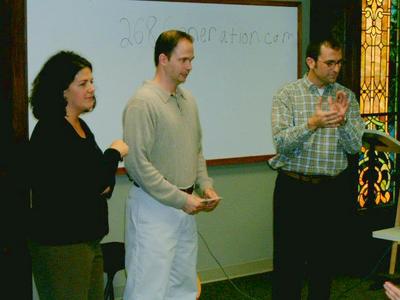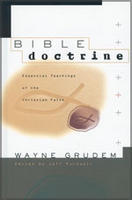 From our friend, Jim Elliff
From our friend, Jim ElliffIt is an elementary lesson in understanding the original languages to see that Matthew 28:19 is not a command to "go" but to "make disciples of all the nations" as you are going." It was not Jesus' intent to say that the individual Christian must change locations in order to evangelize. But it is most certainly the whole church's responsibility to see to it that we make disciples where we are, now. Evangelism is not to be done later when the move takes place, or when the trip is taken to another far off country, or when the special evangelistic project commences, though it is certainly inclusive of these.
Yet, nothing is more discouraging than evangelism. The mere mention of the word strikes fear in most people. If it is my goal when speaking in a church to make all my listeners uncomfortable and convicted, all I have to do is say, "evangelize!," and the guilt quotient rises as fast as the heads drop. Beads of sweat appear on the pastor's brow. It is the great undone command, and none of us like to be reminded of it.
In my view, much of our fear comes because we've made evangelism too difficult and confusing.
First, we often try to do evangelism in a vacuum. Without a group of people enjoying and discussing the opportunities they have had, and without a leader among them who is active in this area, most of us will not find the ongoing stimulus to keep it up. However, when you find this happening, there is a built-in excitement about evangelism. Being in such a group for a long time myself, I'm finding constant motivation to continue. As I hear the stories of normal people, some of them quite reserved, doing what they can to get the word out, I'm charged up and reassured that God can use even me. That's the first help I want you to consider.
For some of you this might mean establishing a weekly small group meeting just to communicate to each other about what is going on in your evangelism. It might be as simple as coming together 30-40 minutes prior to a regular meeting of the church, or meeting with a team of motivated people for breakfast. This meeting should be about your encounters (even the little ones), your concerns, your creative ideas for reaching others, and specific prayer for those you have spoken to or will speak to. In our case, we take 30-40 minutes weekly in our main church meeting in an open session. Much of that time is spent talking about evangelistic encounters. We also take time at the end of the session to pray for each unconverted person who was mentioned. This provides a powerful motivation to do more.
Second, we have the mistaken notion that evangelism is a choreographed set of ideas well laid out, perfectly transitioned and flawlessly presented. Forget it. It's not this way. Many of us have tried this with frustration. It is much better to think of evangelism the way the Bible does—"sowing the seed" in any way you can. Any of us can do that. Ever seen a weed grow in an otherwise barren parking lot? Somehow the seed got there and flourished. The simple word in the right place, or the tract well-placed might be the means God uses. Well-oiled presentations frustrate because there is no room for serious questions and discussion on the one hand, and it rules out the less verbal among us, on the other. Rejoice over even the smallest of advances! You are sowing the seed.
I don't wish to say that there is no value at all in memorizing a set plan. But there are many limitations to such methods. The proof is that the enthusiasm for such plans often dies away after the weeks of concentrated effort are finished. Also, among the least desirable aspects of most of these plans is the fact that they may not encourage listening to the person you are addressing. It's primarily about getting a set of concepts across, rather than finding out the real questions people have and the dilemmas they face. There are people using block plans who work hard at overriding this obstacle, thankfully, but they more prove my point than void it.
Third, we have not made enough of the fact that evangelism has a great deal to do with what you expect God to do. If you raise your antennae as the day begins and ask God to make you an instrument for divine encounters during the day, it will happen—almost every time. Christians living in anticipation of being used by God are like cats on the lookout for mice. They never lose their focus. They seem to sleep with their eyes and ears alert. When you stay ready, you are actually living by the faith you claim to exercise!
Fourth, we have missed the idea of context. Have you ever gone on a mission trip and then come back determined to focus on others who need Christ the same way you did overseas? What happened? You gradually got sidetracked by all the distractions of life. What you need is a mission field here! I'm sure of one thing: If you put a true believer who has his lights on into a dark place, he or she will make a difference. In addition to all the other opportunities "as you are going," you need someplace, or perhaps several places, where your focus is all about people and sowing seed.
For instance, you might make a regular stop at a coffee shop early in the morning. Get to know the workers and the regular customers by name. Then, at the appropriate times, insert a clear word about Christ or pass on a piece of literature for your friend's comments, or whatever gets the seed out. Others of you might join a club or participate in a community college class (or even teach the class!). You might meet people at the gym, or walk regularly in a mall, or . . . you name it. You can bounce these ideas around in your seed-sowing group. Your regular places for seed sowing will help keep you alert for all the other serendipitous moments you might encounter. (see "The Value of Hanging Out" at www.CCWonline.org/hang.html)
Fifth, we have often not made the best literature available in abundance. God brought the gospel to us, not only in the person of Christ, but in words. The history of the use of words in evangelism is remarkable. You should always keep materials available in your purse, car, brief case, and appointment book. In our church we make some key tools available at all times for the group to use. Each week people carry out handfuls of books or booklets for use in evangelism. Some also make use of CDs of evangelistic messages. I love for people to write out their own testimony to slip into a booklet. This multiplies the value of the item you are giving away and makes it much easier for people to receive. "Here's my story about how my life was changed along with a booklet that explains the truths that made the difference. I'd like to give you a copy to see what you think?" This approach is costly. We spend a lot of money providing the best tools for people. But we think it is worth every penny.
Sixth, we have not trained ourselves well in three important areas. It is important to work together on: 1) the content of the gospel, 2) how to converse and build relationships, and 3) some apologetic issues. Interestingly, these are largely untaught. Rather than teaching a block plan, why not study these three strategic aspects of the gospel and its presentation as your training approach?
Teach the content of the gospel itself, not just a set of phrases about the gospel. A man can talk for hours about a car if he understands what's under the hood. A woman can spend the day talking about decorating the home when she has concerned herself with learning the philosophies and combinations that are involved. But when a plan is learned and there is not much biblical and theological knowledge behind the phrases spoken, the presenter is unsure and uncomfortable. He has memorized a few statements and transitions, but what does he actually know? It is no wonder the believer does not want to venture out. "What if someone asks a question?" he thinks. It is the person that knows the most theology that can answer the best and has the least fear.
Learning how to converse provides a wonderful practicum for the group also. My common way of evangelism is to ask questions. I just keep probing until I discover the person's philosophy concerning root issues. It doesn't take a lot of brains to ask the questions. I've learned to get into the thinking of the person. They appreciate that. I respect them as I converse, but I keep probing. Sometimes I say, "That's very different than my view, but please tell me more." I don't explain my view yet; I'm just salting the conversation. I don't mind asking personal questions either. In turn, they eventually ask, "So what is your view about this?" This provides an excellent way to present what I believe about the problem and the solution in Christ. It would do the church well to study the simple art of having a meaningful conversation.
Basic apologetics provide another field of preparation. Although simply understanding the theology of the gospel will take most people a long way, learning how to address certain questions and/or objections that might arise with sound biblical apologetics is also very useful. I am more philosophical in my approach to apologetics, but am not without some interest in hard evidences as well. When you don't have a ready answer, you can just say so. Perhaps you can arrange for another meeting to discuss the issue further, or get the person's address and send him a book on the subject. It's OK not to know everything. Nonetheless, it is part of our improvement in evangelism to have some understanding of apologetics.
I've been evangelistically-driven for most of my life, talking with scores of people personally all over the world about the good news. I've thought this through a lot. Even though I began with a block plan for evangelism, I soon found out its serious limitations. I believe what I'm proposing is a much improved way to make viable, life-long disciple-makers. I think I can prove this with the people God has placed under my care. There is nothing novel or exceptional about what I've said, I realize, but I believe these concepts offer some significant help to those who care about rising above guilt to action.
Contact www.CCWonline.org for evangelistic tools.
Copyright © 2005 Christian Communicators Worldwide, Inc.201 Main, Parkville, MO 64152 USAPermission granted for not-for-sale reproduction in exact form including copyright.Other uses require written permission. Write for additional materials.




















